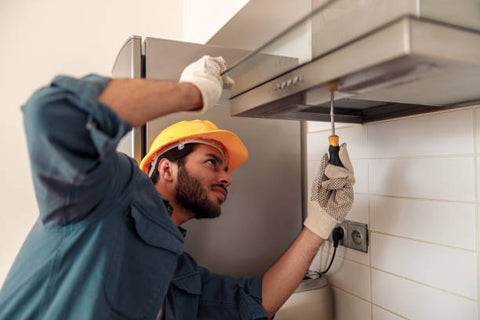The sone-measured noise level of a range hood is influenced by its CFM rating. A higher CFM leads to a noisier hood. If you wish to have a quieter hood, opt for one with a lower CFM. However, it's important to note that any range hood that effectively removes grease, smoke, and cooking exhaust from the kitchen will produce some level of noise. While some are quieter than others, complete silence is not attainable.

A noisy range hood can be a real nuisance, especially if it's located in an open-plan kitchen. If you're experiencing a noisy range hood, instead of replacing the entire range hood, which can be time-consuming and involve research, ordering, inspection, and installation, there are five simple methods to make it quieter and enhance your kitchen experience.
Inspect the fan blades: The fan blades are one of the most common causes of noise in range hoods. If the blades are bent or damaged, they can make a lot of noise as they spin. You can check the blades by removing the grill and visually inspecting them. If you find any damage, you'll need to replace the fan.
Check the fan motor: The fan motor can also result in noise. If the motor is worn out, it can make a lot of noise as it struggles to spin the fan. You can check the motor by removing the grill and listening to see if it's making a lot of noise. If it is, you'll need to replace the motor.
Examine the ducting: The ducting that carries air from the range hood to the outside can also be a source of the noise. If the ducting is too small or has become clogged with grease, it can cause the range hood to make a lot of noise. You can check the ducting by removing the grill and looking at it to see if there's any damage or clogging. If you find any issues, you'll need to clean or replace the ducting.
Check the bearings: The bearings that hold the fan in place can also be a source of the noise. If the bearings are worn out or damaged, they can make a lot of noise as the fan spins. You can check the bearings by removing the grill and listening to see if they're making a lot of noise. If they are, you'll need to replace the bearings.
Inspect the mounting: The range hood may be making a lot of noise because it's not properly mounted. If the mounting brackets are loose, the range hood can vibrate and make a lot of noise. You can check the mounting by removing the grill and checking to see if the brackets are loose. If they are, you'll need to tighten them.
Once you've identified the source of the noise, you can then take steps to fix it. If you're unsure about any of these steps, it's best to call in a professional to help. A professional will be able to diagnose the problem and fix it quickly and safely.
Sum up
A noisy range hood can be a significant source of frustration in the kitchen. Fortunately, there are several easy steps you can take to try and resolve the issue. By starting with a thorough inspection of the fan blades, fan motor, ducting, bearings, and mounting, you can quickly identify the source of the noise and take appropriate action. If any of these steps seem complicated or you're unsure of the best approach, it's advisable to seek assistance from a professional. By taking these steps, you can effectively troubleshoot your noisy range hood and restore peace and quiet to your kitchen environment. Additionally, by fixing the noise promptly, you can ensure the longevity and proper functioning of your range hood.

